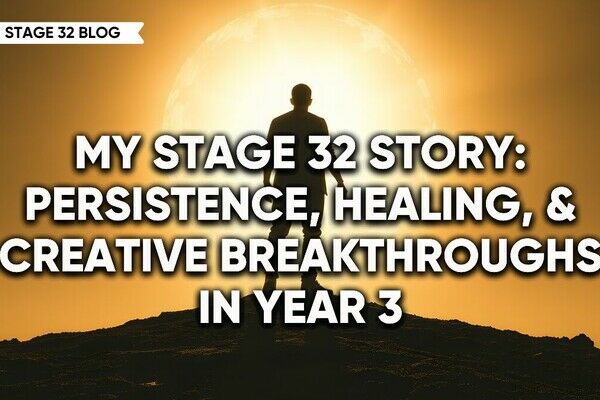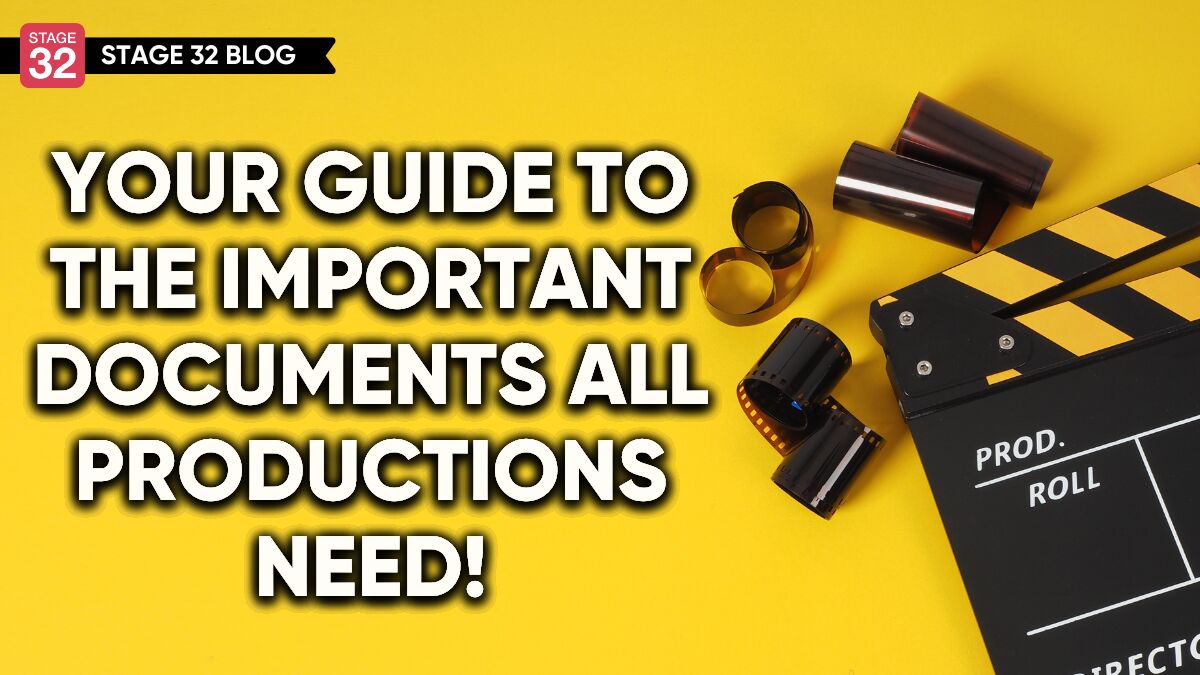Your Guide To The Important Documents All Productions Need!
This is possibly the least popular, but most vital piece of the overall filmmaking process; the documents and releases. Why do documents matter? They are the paper trail, the proof of quantifiable evidence of spending, the necessary schedules and details that the cast and crew rely on, and they protect filmmakers by providing permission for the use of items, locations, etc. throughout the process. Most importantly from the filmmaker’s perspective is the need for documents to be in order so that the project can not only be released; but is best prepared for filmmakers to take meetings with distributors and sales agents at the appropriate time.
The documents that every filmmaker needs in their arsenal for a successful project, when they are needed, and what they are used for are broken down below by each phase of the filmmaking process.

Development:
Funds Tracking
During the development phase of the project, filmmakers will need a way to begin tracking the progress of possible funding sources. Creating grant tracking and production funding spreadsheets is a great way to keep track of the process and progress of what kinds of funding have been secured whether in-kind (services or items) or cash (crowdfunding, investment, grants).
Contracts
You will need to speak with an entertainment attorney to ensure your information is properly binding and written correctly. In many localities, there are organizations that can assist with contracts and taxes. But check to see where and when these services are available!
The contracts that you will want to have in place during development are:
Option Agreements
This contract gives the producer the right to purchase the script within a certain period of time and develop it. Each option will be specific to the agreements set out between the producer and the writer.
LLC Formations
The establishment of the company that will represent the project, a separate business entity that limits liability for legal and tax purposes.
Non-Disclosure Agreements
These agreements protect the project from being shared outside the intended audience during development and beyond.
Memorandum of Understanding/Letters of Intent
The contracts and "MOU/LOI’s" are used to secure and outline the scope of work to be performed by those contracted during the development phase of the project such as:
- Producing team
- Director
- Actors/Casting Director
- Legal
- Accounting
- Pitch Decks
- Film Business Plan
- Marketing Plan
Investor Waterfalls
These are vital to putting together the project as a whole, a line producer, and marketing/distribution producer are vital at this stage to assist in proper business planning and well-thought-out strategies for the entire project process.

Pre-Production
Contracts
The contracts needed at this stage are going to be for securing employment and attachment of the various departments, actors, and anyone else involved in the pre-production and production stages of the process.
Permits
Filming permits will need to be filed for and received before going into production! You must research the permit process for the area where you're filming as soon as possible. Carefully track all of the necessary paperwork to make sure that you're promptly filing everything that you need and receiving all of the finalized permits and information on time.
Releases
Releases give legal permission to use items, locations, pieces of art, branded content, music, and sometimes even references to people in the film. It's important to break down and identify every element that will require a release in your script and then properly pursue this permission through signed releases quickly.
Funds Tracking
You'll need to track your Grants, Crowdfunding, Investment, and In-Kind donations of services or products. As well as a topsheet of Budget, Breakdowns, and Schedule- copies of the plans and workflow to track the progress of the project starting in prep.

Production
Daily Call Sheet
A copy of the daily schedule for each day on set for production, a list of who will be on set, parking instructions, location address, etc. This must be completed and distributed to the full cast and crew ahead of every new day of production!
Daily Production Reports
An overview of the day including any instances of problems, or things to know for the next day.
Continuity Reports
This report is vital for the production and post-production teams to be able to keep track of continuity while in production, as well as for post-production guidance in creating the cuts of the film.
Weekly Budget Reports
Tracking expenditures, reconciling receipts, and accounting for all spending during production.
Exhibit G’s & Payroll Records
Ensure that everyone’s payments and time are accurately accounted for each week.
Vendor Information & Inventory Records
Who to contact for inventory needs, the pricing for replacements, the value of products, and rental fees.
Location Releases, Vendors, & Photos
Tracking for the locations, usage guidelines and releases, and the photos of the locations.
Shot List
All shots that are planned for the filming of the project.
Department-Specific Vendor Information & Rental Agreements
Each department will have different vendors, rental agreements, and usage guidelines. Tracking each of these keeps the project organized and accounted for.
Food & Health Information
VITAL to ensuring that people are properly taken care of on set regarding any HIPPA-protected information. This information is extremely important and sensitive, restricting information sharing to only those that are vital to ensuring proper care is taken. Food allergies, restrictions, health needs, allergies, and concerns have to be taken with utmost care to ensure the safety of everyone on set as well as a happy and healthy cast and crew.
Weapons & Stunt's Chain Of Custody
Safety on set is needed, a chain of custody ensures that only those who are documented to be using, or handling certain items do so on set, creating accountability to ensure safety on set.
Transportation Logs & Schedules
Organization of transportation needs, documents, and schedules for pickups/drop-offs, and anything dealing with this department.

Post Production/Final Deliverables
Contracts
Post-production contracts are separate from other departments within the other phases of the production process such as:
- Editors
- VFX and SFX
- Music Licensing
- Post Production Sound
- Graphics
- Sales Agents
- Distribution
- Marketing
- DCP information, Credits, Closed Captioning
Film Festival & Release Tracking
Tracking applications to film festivals and where the projects are to be released is vital to the marketing strategy, as well as planning the release of the project for publicity.
Weekly Budget, Payroll, & Production Reports
Tracking the overall workflow and actual spending on projects is very important at this stage. You'll need all of these records for tax purposes and you'll likely need to keep them all clearly organized and on file for many reasons.
How Can I Learn More?
If you are interested in a further in-depth walkthrough of these documents check out:
- Stage 32 Certification provides a Feature Film Production Management Master Certification course that you can register for HERE. In this course, you will receive a Master Certificate in Production Scheduling, Crew Agreements, Call Sheets, Budget Creation, Cost Reporting, US Tax Incentive Management, Production Wrap Deliverables, and Final Delivery Elements Of A Feature Film.
- Gemini Crown Tech has developed a fully integrated software package that not only guides the filmmaker through the budget, schedule, and paperwork process; it also contains over 145 templates and reports for an efficient and organized workflow for the documents needed to take your project from development through deliverables; including checklists for each stage of the process.
- Stage 32 Education is providing an upcoming 4-Part Class- Your Step By Step Feature Film Legal Guide - From Production Formation to Distribution starting on July 8th! You can still register for this course HERE.
Have You Joined In On Stage 32's July Filmmakers Club?
Week One Challenges:
- Comment on this week's fantastic July Filmmakers Club Week 1 Blog: Setting Goals For Producing An Independent Film (by clicking HERE) sharing your thoughts and what you're most excited about this July!
- Post in the Stage 32 Filmmaking Club Lounge sharing YOUR current filmmaking goals with us! (You can find it quickly by clicking HERE)
- Comment on at least 3 other members' posts in the Stage 32 Filmmaking Lounge to offer insights, words of encouragement, or support!
By completing this week's challenges, you can set yourself up for success with your goals and be entered to win a FREE Stage 32 Webinar that will be announced LIVE on Stage 32's Instagram this Friday, July 5th at 12:00 pm PT!
Make sure you're following @Stage32 and @rbwalksintoabar to keep up with all of the exciting July Filmmakers Club announcements all month long!
Let's hear your thoughts in the comments below!
Got an idea for a post? Or have you collaborated with Stage 32 members to create a project? We'd love to hear about it. Email Ashley at blog@stage32.com and let's get your post published!
Please help support your fellow Stage 32ers by sharing this on social. Check out the social media buttons at the top to share on Instagram @stage32 Twitter @stage32 Facebook @stage32 and LinkedIn @stage-32
| Celebrate the June 2024 Stage 32 Community’s Successes! |
| July Filmmakers Club Week 1: Setting Goals For Producing An Independent Film! |
Search Stage 32 Blog
There are now 4042 blog posts for you to enjoy. Search them all by tags below.
Acting, Advice, Cinematography, Coffee & Content, Composing, Contests, Distribution, Featured, Filmmaking, Financing, Inspirational, Networking, Producing, Screenwriting, Success Stories, Tips, Trending,Relevant Tags
Recommended Articles

Coffee & Content: Low Stakes Stories, High Stakes Decisions

My Stage 32 Story: Persistence, Healing, & Creative Breakthroughs in Year 3

Stage 32 Certification Featured In IndieWire!

Happy Thanksgiving From Stage 32: We Are Thankful For YOU

Insider Intel: 2025- Your Year of Breakthroughs (+ What's Coming in 2026)

How to Get Help from Stage 32: Meet the Teams Behind the Scenes

Stage 32 Now Certifying Centro de Portugal Film Commission!

Insider Intel: 2026 Predictions

Stage 32 + DramaBox Join Forces to Launch World's First Vertical Drama Incubator







